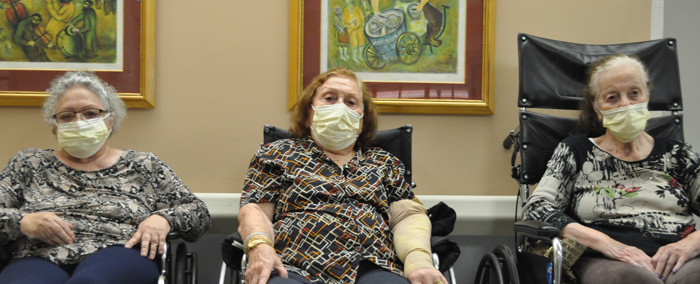The Three Musketeers of Los Angeles Jewish Health


The Three Musketeers of Los Angeles Jewish Health

When Talat Barahmand, Iran Diansedgh, and Zaghi Kohan Ghadosh moved into Los Angeles Jewish Health, they expected to find vital assistance in meeting their daily critical care needs. What they did not expect was to find fast friendships that would ease their transition to a new living situation and fill their days with joy.
The three women arrived at Los Angles Jewish Health not knowing one another: Iran about six years ago, Talat around five years ago, and Zaghi, most recently, approximately, three years ago. Sharing a common background (all are originally from Iran) and a common language (Farsi), they quickly connected and have been inseparable ever since.
Iran and Zaghi are roommates in the Mark Taper building; Talat lives across the hall. Rabbi Karen Bender, chief mission officer at LA Jewish Health, refers to the friends as "the Three Musketeers."
"They spend as much time together as possible, and it's just amazing," she says. "What a gift they have received and given to each other by finding best friends at this stage of life!"
Iran, 100, is a native of Teheran; she and her husband fled after the Islamic Revolution. They landed in Dallas, Texas, where they had a daughter, son-in-law, and grandchildren, and spent roughly 15 years living there before making their way to Southern California, home to their other two children. Her husband passed away in 2007, and she lived on her own until her health and advancing age made independent living impossible.
As Iran tells it, her experience at Los Angeles Jewish Health has been excellent – the people and the service have all been wonderful. She is especially grateful to be able to spend her days alongside Zaghi and Talat.
"We do everything together: playing bingo, attending Shabbat services, listening to music," she says. "We're all really happy."
Of course, there are occasional disagreements; all three women prefer to see themselves as being in the right. "We may argue, but there are no actual fights!" Iran laughs.
Zaghi, 90, has been in the United States for two decades. She came from the Iranian city of Shiraz, which she fled because of the increasing intolerance of the authoritarian government. In Iran, Zaghi's family was quite wealthy, but during the revolution they lost everything: their home, the two cinemas they owned, and extensive property holdings.
Los Angeles made sense as a destination because two of her five children lived here. It was difficult to adapt to an unknown environment, but with her family's support she built a new life. "I miss Iran, but I like California," she says.
When mobility issues made it clear she could no longer live without assistance, she moved into Los Angeles Jewish Health and was thrilled to meet people with similar backgrounds. "My friends are the best, and I love talking with them," she says. "We chat, we watch Persian TV, and sometimes, as Iran pointed out, we argue. But we always stay close."
At 86, Talat is the youngest of the group. She and her husband, along with one of their three daughters, emigrated from Iran in 1996 as a result of religious persecution, making their way to Los Angeles, where their other daughters and their son already lived. It was a difficult move, but they were thrilled to be reunited with family and away from a repressive regime.
After Talat's husband died in 2011, her deteriorating vision made living alone a health hazard, and she chose to take up residence at Los Angeles Jewish Health.
The decision, she says, was a good one. "I love it here. They take such good care of me, and everyone is very friendly."
Talat is extremely outgoing, and having her friends as a social outlet has been a godsend. "Zaghi, Iran, and I all help each other. We're all Jewish, and it's so nice to be able to speak Farsi and to have people I get along with so well."
Rabbi Bender says the Three Musketeers' friendship is as special as the women themselves. "When I greet them 'Shabbat Shalom,' they will often respond not only by saying, 'Shabbat Shalom,' but also by giving me a blessing. It's truly an honor to have three such wonderful women living here with us."
Seeing Zaghi, Talat, and Iran interact every day has led Rabbi Bender to marvel at how fortunate they are to have formed such a tight-knit bond.
"If I spoke Farsi, I would petition to become their Fourth Musketeer!" she says.